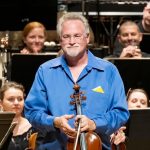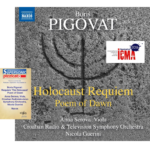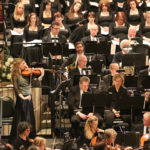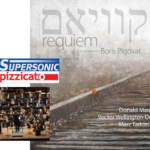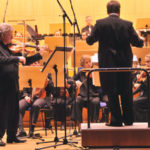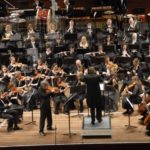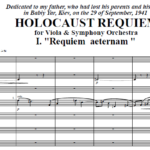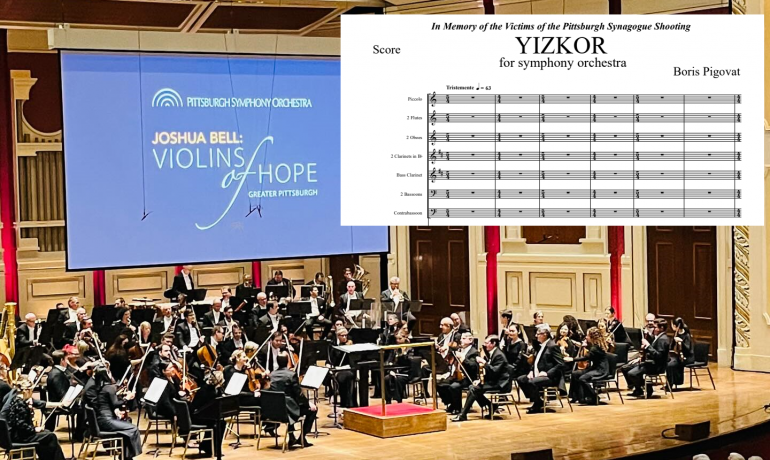
Tag: symphony orchestra


Jerusalem
- Duration: ca. 17 minutes
- SO: Picc, 2 Fls, 2 Obs, 2 Cls, B.Cl, 2 Bsns, C.Bsn, 4 Hns, 3 Tpts, 3 Tbns, Tba, Timp, Perc, Hp, Cel, Str.
- SWB: Picc, 2 Fls, Ob, Bsn, 3 Cls, B.Cl, 2 A.Sxs, T.Sx, B.Sx, 4 Hns, 5 Tpts, 4 Tbns, Bar, 2 Tbas, Harp, Str.B, Synth, Timp, Perc
The inspiration behind this work is a city at the centre of three religions – Judaism, Christianity and Islam, City whose name means “peace”, and whose fate is war, City which has known pain and joy, destruction and renewal, sadness and hope, City whose past is submerged in blood. As for its future… Would anybody dare to say that he knows it?
The poem Jerusalem exists in three versions: for solo piano, for symphonic wind band, and for symphony orchestra.
I wrote the piano version in 1991, and revised it in 2002 and in 2009.
Below is a recording of the 2002 version, performed by Michael Zelevinsky in Jerusalem.
The final piano version premiered in 2014 in Paris, at the first COMPETITION-FESTIVAL – modern piano repertoire, performed by Olivier Seuzaret.
Jerusalem for Piano was published in 2015 by Le CHANT du MONDE, Editions Musicales (in France).
In 2017, this work was performed several times by Albanian pianist Almira Emiri. Below is a recording from YouTube.
In 2012, I wrote the symphonic wind band version.
It was premiered in 2013 by the Petach-Tikva Conservatoire Wind Orchestra, conducted by Michael Delman.
Below is an audio recording of that performance. Although both the orchestra and the recording are not professional, the performance was very enthusiastic and presents a favorable rendition the work.
I wrote the initial version for symphony orchestra in 1993, shortly after I wrote the piano version. However, I was not satisfied with the result; I’ve added a lot of additional content to orchestral version, and the combination resulted in a musical structure that lacked cohesion.
After I wrote Holocaust Requiem in 1994-1995, my attitude towards orchestration changed. As result,I put aside Jerusalem until autumn 2017, when I prepared a new version.
Below are recordings of the piano solo version and of the symphonic wind band version.
Piano Solo version
Symphonic Wind Band version
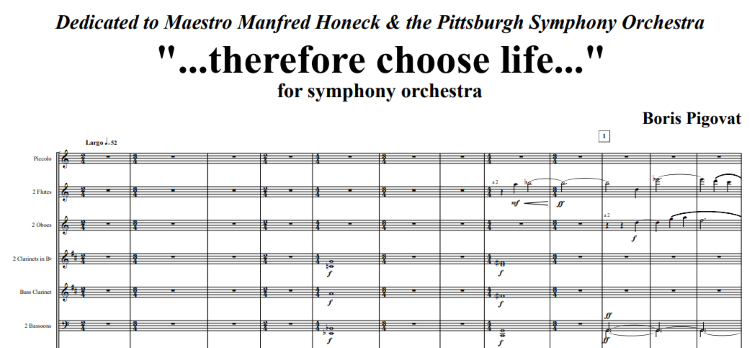
Sept, 2017: Therefore Choose Life for Symphony Orchestra
- Duration: ca. 14 minutes
- Picc, 2 Fls, 2 Obs, 2 Cls, B.Cl, 2 Bsns, C.Bn, 4 Hns, 3 Tpts, 3 Tbns, Tba, Timp, Perc (3), Hp, Cel, Str.
Therefore Choose Life was commissioned by the Pittsburgh Symphony Orchestra (PSO) in honor of Manfred Honeck‘s tenth season as music director. The work premiered in Heinz Hall on September 22, 2017, and conducted by Manfred Honeck.
The work based on verse from Deuteronomy 30:19:
I call heaven and earth to record this day against you, that I have set before you life and death, blessing and cursing: therefore choose life, that both thou and thy seed may live…
I feel that the phrase “therefore choose life” is essence of the verse.
In my work I tried to express my feeling that life (with all its pain, suffering and tragedies) is meant to be filled with beauty, hope, light and love.
I have written other pieces based on biblical themes: “The Lamentations of Jeremiah” oratorio, A Song of Ascent for Symphony Orchestra, and On Mount Sinai for Symphonic Wind Band. Hence, I was very glad to know from the PSO that maestro Honeck was hoping that my new work “would be inspired by spirituality”.
Therefore Choose Life was written as a free symphony poem, and its duration is approximately 14 minutes.
There are not quotes or references to Jewish liturgical music or other music, but in the coda, the theme of flutes & clarinets alludes to the singing of morning prayers or psalms.
In 2023, Therefore Choose Life was performed in Israel by the Israel Philharmonic Orchestra (Conductor – Lahav SHANI).
The 11-minute symphonic poem is meditative but well varied at slow tempos, starting with a strong statement by the strings that conveys concern and aspiration. It leads to a section expressing some of life’s pains before turning to its antithesis – a beautiful and lushly scored section lifted by the light of a flute solo...
When I conducted the Israel Philharmonic, I got to know Boris Pigovat a little more and started looking at other pieces he's written. I wanted to do more with him. So I was very happy when he agreed to write something new for this season. I think his musical language is very beautiful. It has Russian depth and enormous emotions, but he is also a very, very humble man.
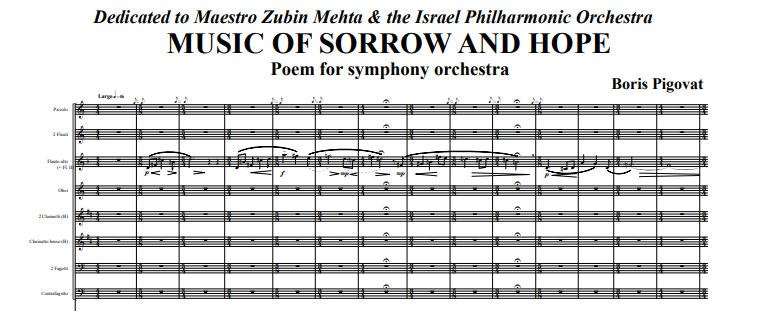
Music Of Sorrow And Hope (2011)
- Duration: ca. 22 minutes
- 3 Fls (Fl.III = Picc, Fl.II = Alto Fl.), 2 Obs, 2 Cls, B.Cl, 2 Bsns, 4 Hns, 3Tpts, 3 Tbns, Tba, Timp, Perc, Hp, Str.
Music of Sorrow and Hope was commissioned and premiered by the Israel Philharmonic Orchestra (conducted by Zubin Mehta) at their 75th Anniversary Festival in December 2011.
The theme of this work is explained in the concert’s program notes:
Sorrow, pain, suffering, anger, struggle, hope and light – it is our way and our destiny.
In 2013, Maestro Mehta and the Israel Philharmonic Orchestra performed this
work again in two concerts of their subscription series.
Below are an audio recording and a YouTube video from the live recording of the premiere.
IPO’s 75th Anniversary Festival, Tel-Aviv, December 2011
Israel Philharmonic Orchestra
Zubin Mehta, Conductor
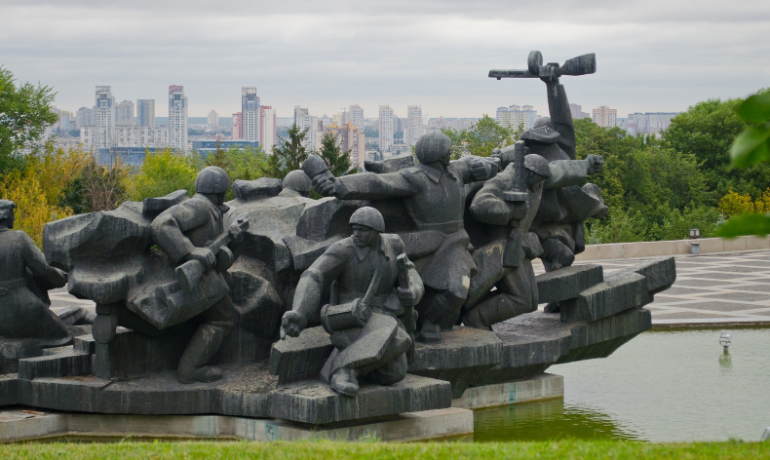
Symphony No.1 "Memorial" (1984; revised in 1987)
- Duration: ca. 28 minutes
- 3 Fls (Picc), 2 Obs (E.Hn), 3 Cls (B.Cl), 2 Bsns, 4 Hns, 3 Tpts, 3 Tbns, Tuba, Timp, Perc (4), Cel, Hp, Str.
The Memorial symphony is dedicated to the victims of World War II, a theme that touched me personally.
I was very excited for the composition’s premiere to be performed by the USSR Symphony Cinema Orchestra, in 1988, in Moscow. For a young composer, this was an amazing opportunity. Plus, this was the first time that I heard the symphony performed live, and it was also recorded — by the best orchestra I could have wished for at that time.
Below, is the live recording of the premiere. The recording is old, and there are some background noises, so please accept my apology for that.
The Ministry of Movies Industry Symphony Orchestra, Moscow
Emin Khachaturian, Conductor
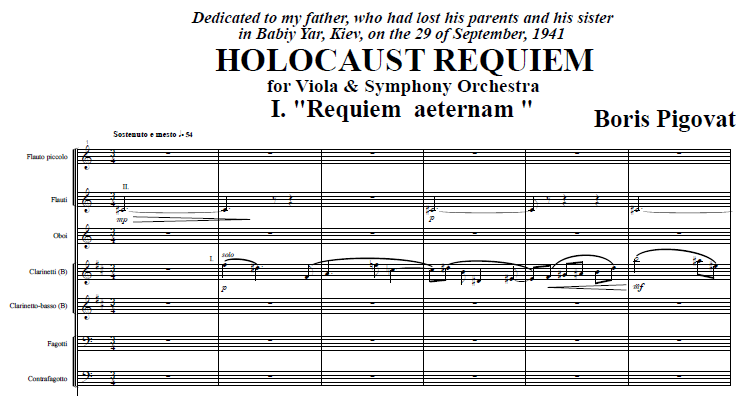
Holocaust Requiem for Viola and Symphony Orchestra (1994-1995)
- Duration: ca. 46 minutes
- 3 Fls (Picc), 2 Obs, 3 Cls (B.Cl) 2 Bsns, C.Bn, 4 Hns, 3 Tpts, 3 Tbns, Tba, Timp, Perc (4), Cel, Pno, Hp, Vla solo, Str.
For years, I felt the necessity to write a work dedicated to the Holocaust. After my immigration to Israel I started to consider different ideas for such a work. At first, I wanted to write a requiem for the standard orchestration: soloists, choir, orchestra and, maybe, narrator. At that time, Yuri Gandelsman, the principal violist of the Israel Philharmonic Orchestra, asked me to write something for him. He was an excellent violist whom I had known for years – we learned at the same time at Gnessin College and then at Gnessin Institute (Academy of Music). So, when he asked me to write for him a work for viola and symphony orchestra, I suddenly understood – I would write a requiem for viola and symphony orchestra! I would write the work without the text, without the choir and solo singers, but I would try to save the tragic atmosphere of a traditional requiem.
I dedicated Requiem to my father, whose family was murdered in Babi Yar by Nazis in September of 1941. It took me about two years to write it, during which I felt that he was waiting for me to complete it. The day after I finished writing Requiem, my father passed away.
In the end, Yuri Gandelsman did not perform Requiem.
In October 1995, less than a year after it’s composition, Requiem received the ACUM (Israeli ASCAP) award.
The world premiere of Requiem took place in October 2001, at the memorial evening dedicated to Babi Yar tragedy, in Kiev, by remarkable violist Rainer Moog and the Symphony Orchestra of National Philarmonic Society of Ukraine, conducted by Roman Kofman.
Requiem was performed again seven years later at the Concert of Remembrance for the 70th Anniversary of Kristallnacht, at an outstanding performance by Donald Maurice and the Vector Wellington Orchestra in New Zealand, conducted by Marc Taddei. Later, a live recording was released by Atoll with three more of my pieces.
After listening for the Kiev recording of Requiem, violist Anna Serova and conductor Nicola Guerini pushed Naxos to record Requiem. The Naxos compilation includes another piece that I wrote for Anna: Poem of Dawn for Viola and Symphony Orchestra.
Both the Atoll CD (in 2011) and the Naxos CD (in 2015) received Pizzicato’s Supersonic Award, and the Naxos CD was also nominated for the 2016 ICMA award.
In 2021, Professor Maurice and his PhD student Xi (Lucy) Liu produced a film Lacrimosa Dies Illa, which is based on Requiem, as Lucy’s PhD research. The film premiere took place in Wellington’s Penthouse Cinema in May 2021.
Click here for more information about this documentary. The film itself is available online here (the trailer can be found here).
In September 2023, the US premiere of Holocaust Requiem took place in Annapolis by Peter Minkler and Annapolis Symphony Orchestra, conducted by José-Luis Novo.
I am honored to have such wonderful performers for the piece!
Below is a live recording of the outstanding premiere performed in Kiev and few samples from a performance in Wellington. Additional recordings and information about Requiem performances can be found in my website by using the SEARCH widget from the main menu or the sidebar (type requiem).
Recording from Memorial Evening dedicated to Babi Yar tradegy in Kiev, 2001
Rainer Moog, Viola
Roman Kofman, Conductor
Symphony Orchestra National Philarmonic Society of Ukraine
Samples from recording from Concert of Remenbrance for Kristallnacht Anniversary in Wellington, 2008
Donald Maurice, Viola
Marc Taddei, Conductor
Vector Wellington Orchestra
Pigovat's Holocaust Requiem may prove to be one of the three finest masterpieces ever written for viola, with the Bartók and Walton Viola concertos. It now primarily needs time and exposure and to become known in contemporary 21st century literature.
